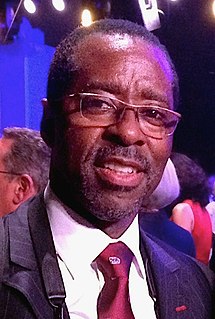A Quote by Anthony Mackie
Practice your improv more than learn your lines. 'Cause there's no way you'll be able to learn all those lines in a short time. You have to realize what you know and what you don't know - and what you don't know, just come up with three alternate lines or improv that you can put in that spot.
Related Quotes
Televisison is like a factory line. You need discipline and focus. You have to hit your mark and know your lines. It's not that I don't know my lines when I do a film, but the pace of discovery is always a little bit more relaxed and nurturing and almost babying, in a way. Television toughens you up, and I like that, but I don't want it to toughen me up too much.
Look what we are trying. You call it dharma, but it is not. What we are trying is to come together; come together to an understanding. The difference is, the discipline is, the commitment is that we are going to come together with the following guiding lines: 'May the long time sun shine upon you, all love surround you, and the pure light within you guide your way on.' When we came together we decided we would guide our way on. My way and your way we already know, so we do not need to learn that. Each one of you knows 'my' way and 'your' way. All we have to learn is 'our' way."
Sometimes, when I have to learn the lines in German and French, it's that much more difficult because it doesn't just sink in automatically, organically. I have to memorize it. It's a tricky thing, as well, as when you improvise, sometimes you want to say something but you don't know how to put it. It's more difficult than in your mother tongue. It's a challenge but, at the age of fifteen, I put myself up for it and I was aware that it would be an obstacle and many times.
The only thing I know that makes me feel comfortable is to know as much as I can. Not like what the shots are going to be, but knowing enough about my character that I can forget those things. And more specifically, my lines. I have to know my lines. I have to know something really well, so I can forget it when we're doing it. And there is comfort in knowing, "Okay, there's not another stone that I could have overturned."
They tell you to memorize your lines, follow your light, and hit your marks. Those are the three things that you shouldn't do. You should not learn your lines, you should not hit your mark, and you should never follow your light. Find your light - that's my opinion. Everyone else will tell me I'm wrong, but that's my opinion.
Those of us raised in modern cities tend to notice horizontal and vertical lines more quickly than lines at other orientations. In contrast, people raised in nomadic tribes do a better job noticing lines skewed at intermediate angles, since Mother Nature tends to work with a wider array of lines than most architects.
Most of the time, with voice-overs, you're recording before they've got the graphics, and you also don't get a whole script. I get my lines, as I show up that day. You don't know what the rest of the story is, so you really rely on the people in the room that you're working with, so they can fill you in on what's going on, right around your particular lines.



































